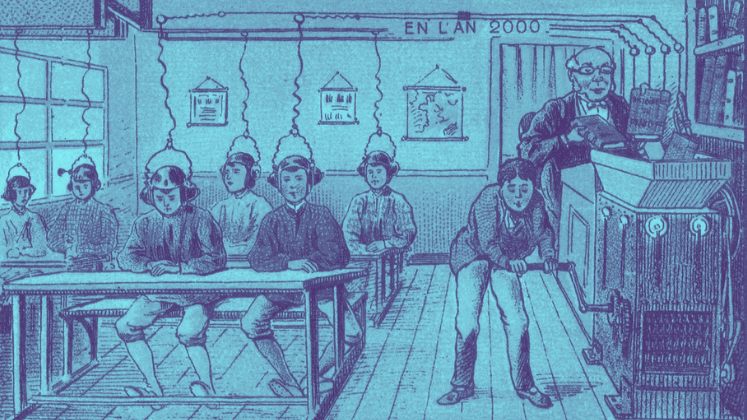The word nostalgia connects a sense return and homecoming with sadness, and was originally used in a medical sense to describe the melancholy felt by soldiers fighting away from home. In this post Mary Evans considers how nostalgia for a past academy presents both a painful reckoning for UK higher education’s imperial legacy and current global influence, but also a possibility and responsibility for researchers in prestigious universities to preserve key academic freedoms.
Nostalgia is sometimes identified as a peculiarly British affliction and one which should be contested. But, perhaps there are certain instances where prestigious British universities can use nostalgia in immediate contemporary ways.
It is not, it should immediately be said, that these institutions need to, or should, feed upon those idealisations of the past, when handsome young white men ran Olympic races, or evaded the university police in ‘harmless’ fun. Nor is it part of that much less fictional past when women were allowed scant access to privileged resources and dined, literally as well as metaphorically, on more meagre diets than those of men.
It is more about the resources, academic and political, offered to ancient, and less ancient, but no less prestigious, UK universities which have now become, in national and global league tables, ‘leaders’. Resources , both material and intellectual, that allow these institutions to make choices about maintaining academic freedoms, to teach and research, which might otherwise disappear. Many continuities exist between past and present prestige. But, within this, there are notable and important contradictions which emerge from that forceful presence of institutions around whom nostalgia is ever present.
The first of these is the question of the engagement of academic elites (in both institutional and individual terms) with Britain’s imperial past. It is a past that has become increasingly problematic in both intellectual and political contexts, as research demonstrates the income from various contexts and practices of the British Empire enjoyed by these institutions. Professor Catherine Hall and her colleagues at University College in London have, for example, shown the financial rewards of slave owning. Research of this kind inevitably raises questions about how far any institution or person can speak of ‘tradition’ without a very wary glance over its or their shoulder.
Research of this kind inevitably raises questions about how far any institution or person can speak of ‘tradition’ without a very wary glance over its or their shoulder.
At least as importantly, research on, and discussion about, the various connections of Empire make essential a curriculum that thinks globally as well as nationally; it asks the question of what we are nostalgic about. So, with the continuation of privileged status, has come an unavoidable engagement with questions of the social and political meaning and consequences of a globalised world.
In the context of current attacks on the curriculum of universities this raises a second contradiction. This is not just about arguments and battles that rage across the UK about de-colonising the curriculum. Those battles are as important as they are contentious. The larger issue here is that of government attacks on humanities subjects as a whole. The last five years have seen the recruitment of students for degrees in English literature tumble, with a consequent fall in their financial support. Government ministers have seen fit to identify the study of English as less important than STEM subjects. Many universities cannot withstand this attack. But the most prestigious, precisely because of that prestige, are able to do so and continue to teach and recruit those subjects marginalised elsewhere. A forcible demonstration that in questions of student choice the status of the awarding university can be more important than the degree subject.
Here some of us might meet what we can describe as, if not ‘good’ then at least ‘useful’ and complex nostalgia; a form of nostalgia, which may allow privilege, but also continues to permit a space for academic contest and differences. In this, whilst we might be sceptical about over-arching respect for traditions, we nevertheless recognise the value of there being at least some locations, where academic values other than the purely pragmatic or instrumental can exist. As the hope of some, that more regulation of universities would disrupt ancient hierarchies was not realised and the assumptions of the impact of regulatory democracy are largely defeated. All the more important then, that those institutions that benefit from privilege should recognise their responsibility for maintaining the subjects and the teaching most often attacked.
in 2023, as genuinely open space in the academy is limited, what these, and other institutions like them, do possess is a powerful authority in which nostalgia and tradition play their part
At the same time, we also need to look outside the UK for what is less a contradiction than a complex reading of ideas about modernisation and and its relationship to educational practice. The British Empire bequeathed to many of its territories a template for education. Universities and centres of learning certainly existed across the Empire before the British arrived, but what was established by the colonial presence were ideas about assessment of staff and student, the nature of disciplines and – in many cases – a veneration of ancient British universities as definitive of academic practice. Yet this close relationship has a new form: in which universities across the global south turn away from humanities subjects and invoke the need to excel in those same STEM subjects praised in the UK. Those subjects have been embraced in the UK in terms of ‘progress’ and the need for various kinds of technological advance. But, the enthusiastic replication of those subjects in the global south can limit contexts for the consideration and discussion about the identity of those who benefit from change, the history of the dynamics of social transformation and the subjective experiences of individuals who have lived with it.
In this discussion a theme might appear to be emerging about the value of nostalgia and the way in which, despite its many conservative and reactionary possibilities, it can actually allow important forms of continuation. Any reading of the history of, for example, Oxford or Cambridge will reveal that they have what can only be described as mixed histories in terms of their recruitment, their veneration of the past, their determined allegiance to conservative curricula and their lack of openness to the collective ‘other’. But in 2023, as genuinely open space in the academy is limited, what these, and other institutions like them, do possess is a powerful authority in which nostalgia and tradition play their part. The question is whether or not that tradition can be used in the interests of those, across the global, excluded from it.
The content generated on this blog is for information purposes only. This Article gives the views and opinions of the authors and does not reflect the views and opinions of the Impact of Social Science blog (the blog), nor of the London School of Economics and Political Science. Please review our comments policy if you have any concerns on posting a comment below.
Image Credit: Ray Harrington via Unsplash.








